CALL TODAY 646-846-1136 | EMAIL
Surgical Experts Dedicated to Improving Lives
At Lenox Hill Minimally Invasive Surgery PLLC, Dr. Valery Dronsky and his staff of medical professionals provide compassionate care with the highest ethical & professional standards. In our state of the art facility, we offer surgical services using only the most cutting edge and current procedures and treatments. We specialize in general surgery, including extensive experience in performing hernia repair surgery. Our expertise is in minimally invasive surgery and robotic surgery. Minimally invasive and robotic surgery often allow patients to experience easier recovery than traditional open surgery. They also allow for more precise and less traumatic surgery. When robotic and minimally invasive surgery is not an option, we are also skilled and experienced in traditional open surgical procedures.
Dr. Dronsky is an experienced and highly skilled surgeon having undergone extensive training in school, residency and fellowships. He practices medicine with ethical behavior, compassion and superb bedside manner. In the operating room he exhibits precision mechanical abilities, analytical thinking and the ability to visualize tissue in three dimensions. These innate and learned skills allow Dr. Dronsky to be one of the most dexterous and skilled professionals in New York City and the Country.
Call us: 646-846-1136
PATIENT TESTIMONIALS
Recent Awards
We are honored and deeply appreciative to have consistently received prestigious awards and recognition year after year, establishing us as one of New York’s foremost hospitals for a wide range of general surgeries, safety measures, specialized procedures, and overall excellence in healthcare. At Lenox Hill Minimally Invasive Surgery, our unwavering commitment lies in delivering exceptional care and unwavering support to our patients, guaranteeing their safety and successful recovery throughout their entire surgical experience.
Hospital Quality Awards
 America’s 50 Best Hospitals Award™ (2023, 2022)
America’s 50 Best Hospitals Award™ (2023, 2022)
Top 1% in the nation for providing the highest clinical quality year over year.

America’s 100 Best Hospitals Award™ (2021)
Top 2% in the nation for consistently delivering clinical quality year over year.

America’s 250 Best Hospitals Award™ (2023, 2022, 2021)
Top 5% in the nation for consistently delivering clinical quality.

Patient Safety Excellence Award™ (2023, 2022)
Top in the nation for providing excellence in patient safety by preventing infections, medical errors, and other preventable complications.
Specialty Clinical Quality Awards

America’s 100 Best Hospitals for Cardiac Care Award™ (2023, 2022, 2021, 2020, 2019)
Superior clinical outcomes in heart bypass surgery, coronary interventional procedures, heart attack treatment, heart failure treatment, and heart valve surgery.

America’s 100 Best Hospitals for Coronary Intervention Award™ (2023, 2022, 2021, 2020, 2019)
Superior clinical outcomes in coronary intervention procedures (angioplasty with stent).

America’s 100 Best Hospitals for Prostate Surgery Award™ (2023, 2022, 2021)
Superior clinical outcomes in prostate removal surgery and transurethral resection of the prostate.
Click to see all of our Healthgrades best doctors awards
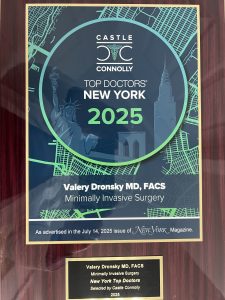
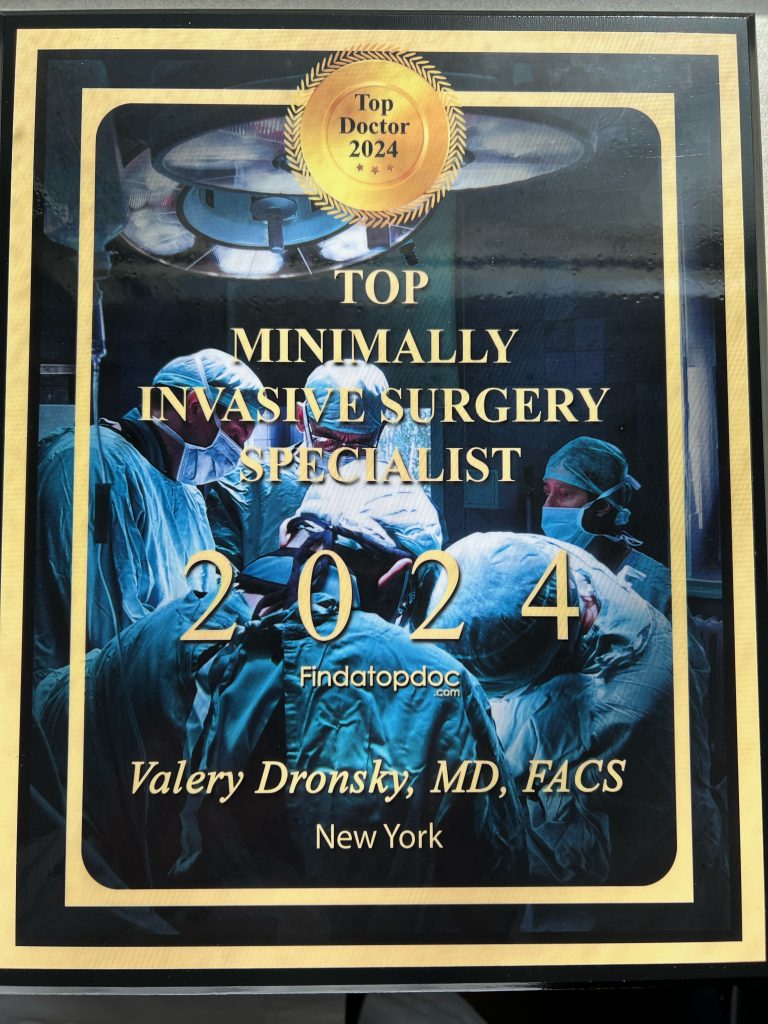
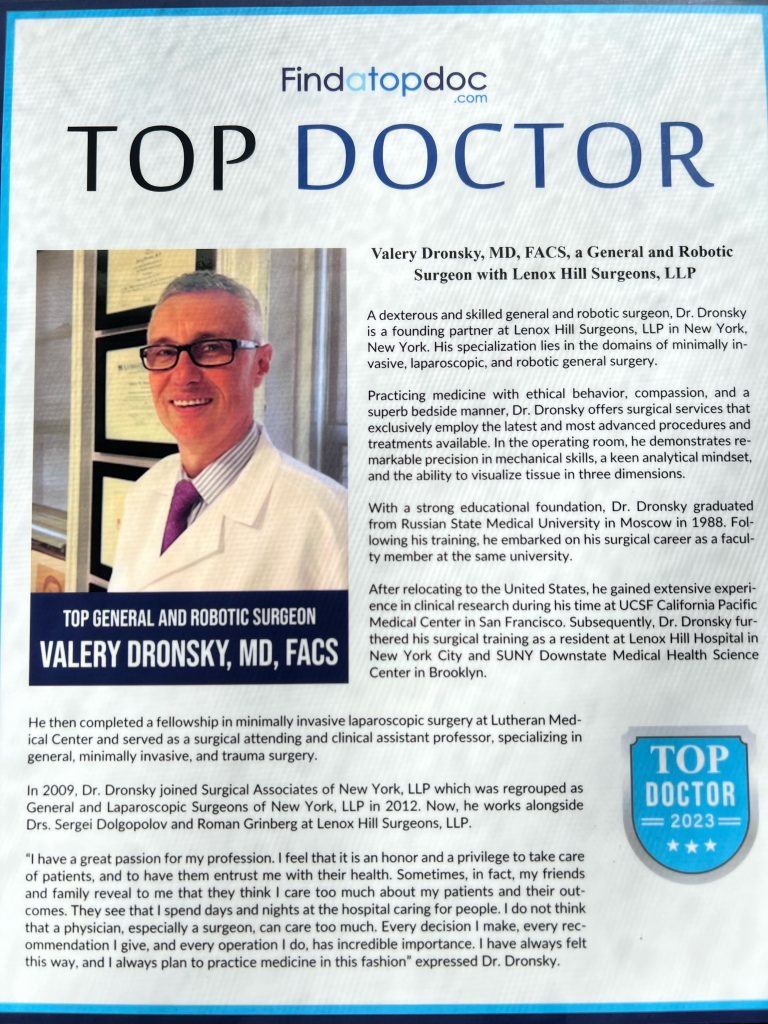


Visit our main website at www.LenoxHillMinimallyInvasiveSurgery.com
Blog Posts are Below:
Category Archives: Minimally Invasive Surgery
Advanced Techniques in Minimally Invasive Surgery
Here we’ll explore the most advanced techniques in minimally invasive surgery, their benefits, and how they’re being used to improve patient outcomes across a wide range of general surgical procedures. Minimally invasive surgery (MIS) has transformed modern medicine by offering patients safer procedures, shorter recovery times, and better cosmetic outcomes. As surgical technology evolves, so do the techniques that surgeons use to treat complex conditions with minimal disruption to the body. Today’s most advanced MIS methods utilize high-definition imaging, robotics, and refined instrumentation to provide extraordinary precision and reduce the risk of complications.

What Is Minimally Invasive Surgery?
Minimally invasive surgery refers to any surgical procedure performed through small incisions using specialized instruments and guided imaging. Unlike traditional open surgery—which requires large incisions and often longer healing—MIS techniques aim to achieve the same or better clinical results with less trauma to the body.
Common forms of MIS include:
- Laparoscopic surgery
- Robotic-assisted surgery
- Endoscopic procedures
- Single-incision laparoscopic surgery (SILS)
Laparoscopic Surgery: The Foundation of MIS
Laparoscopic surgery remains the most widely used minimally invasive technique. Surgeons make small incisions and insert a camera (laparoscope) along with surgical instruments to perform the procedure. A video monitor displays high-resolution images, allowing the surgeon to navigate internal structures with precision.
Common laparoscopic procedures include:
- Gallbladder removal (cholecystectomy)
- Appendectomy
- Hernia repair
- Colon and small intestine surgery
- Gynecologic and urologic procedures
Benefits of laparoscopic surgery include reduced postoperative pain, faster recovery, and a lower risk of infection.
Robotic-Assisted Surgery: Enhancing Precision
Robotic-assisted surgery represents the next frontier in minimally invasive techniques. The surgeon controls robotic arms from a console while viewing the surgical site in 3D high-definition. This approach allows for greater dexterity, flexibility, and control than the human hand alone.
Robotic surgery is especially effective for:
- Complex hernia repairs
- Colorectal surgery
- Adrenal, thyroid, and pancreatic surgery
- Reoperations and scar tissue removal
Advantages of robotic-assisted surgery include:
- Greater precision in delicate areas
- Enhanced visualization of anatomy
- Reduced risk of complications
- Improved cosmetic results due to smaller incisions
Single-Incision Laparoscopic Surgery (SILS)
SILS is a highly advanced technique that uses a single incision—usually through the belly button—to perform surgery. This method is even less invasive than traditional laparoscopy and offers excellent cosmetic results.
Benefits of SILS:
- Virtually scarless procedures
- Shorter operative times in select patients
- Faster return to normal activities
SILS is currently used for selected patients undergoing appendectomy, cholecystectomy, and certain gynecologic procedures.
Endoscopic Procedures: Non-Surgical Solutions
Endoscopy is another form of minimally invasive technique that uses a flexible tube with a camera to diagnose and sometimes treat conditions inside the digestive tract.
Advanced endoscopic procedures include:
- Endoscopic mucosal resection (EMR)
- Endoscopic retrograde cholangiopancreatography (ERCP)
- Endoscopic sleeve gastroplasty (ESG) for weight loss
These approaches allow some conditions to be treated without any incisions at all.
Technological Advancements Supporting MIS
Ongoing innovation is making MIS safer and more effective. Technologies that support advanced minimally invasive surgery include:
- 3D imaging and real-time navigation
- High-definition and 4K video systems
- Fluorescence-guided surgery for better visualization of tissues
- Enhanced energy devices that seal vessels and minimize bleeding
These tools allow surgeons to perform procedures with unmatched accuracy and patient safety.
Common Conditions Treated with Advanced MIS
Minimally invasive techniques are now used for a broad spectrum of general surgical conditions, including:
- Gallstones and gallbladder inflammation
- Appendicitis
- Hernias (inguinal, ventral, umbilical)
- Gastroesophageal reflux disease (GERD)
- Colon and rectal cancer
- Pancreatic and liver tumors
- Adrenal and thyroid nodules
Patients with these conditions often benefit from quicker recovery, less postoperative discomfort, and better overall outcomes.
Conclusion: Advancing Patient Care with Modern Surgical Techniques
Advanced minimally invasive techniques have dramatically improved the landscape of general surgery. From laparoscopic and robotic-assisted procedures to SILS and endoscopy, these approaches offer safer, more effective options for treating a wide range of conditions. Patients experience less pain, faster recovery, and reduced complications—allowing them to return to their daily lives sooner and with fewer limitations.
If you are exploring surgical options in NYC, consider a consultation to determine whether a minimally invasive approach is right for your condition.
Contact Information
LENOX HILL SURGEONS LLP
155 East 76th Street
New York, NY 10021
Tel: 646-846-1136
Email: lenoxhillsurgeons@gmail.com
Why Lenox Hill Minimally Invasive Surgery PLLC is a Top Choice for NYC Patients
 When selecting a surgical team in New York City, Lenox Hill Minimally Invasive Surgery PLLC, led by Dr. Valery Dronsky, provides experience, innovation, and compassionate care. The practice has earned its reputation as a trusted surgical practice by providing top-tier, patient-centered care using advanced minimally invasive techniques. For those seeking general surgery with less pain, faster recovery, and superior outcomes, this practice is a standout choice.
When selecting a surgical team in New York City, Lenox Hill Minimally Invasive Surgery PLLC, led by Dr. Valery Dronsky, provides experience, innovation, and compassionate care. The practice has earned its reputation as a trusted surgical practice by providing top-tier, patient-centered care using advanced minimally invasive techniques. For those seeking general surgery with less pain, faster recovery, and superior outcomes, this practice is a standout choice.
Here’s why Lenox Hill Minimally Invasive Surgery PLLC is a preferred option for patients throughout NYC.
1. Expertise in Minimally Invasive Techniques
At Lenox Hill Minimally Invasive Surgery PLLC, the focus is on laparoscopic and robotic-assisted surgeries. These modern techniques offer substantial advantages over traditional open surgery, including:
- Smaller incisions and less scarring
- Reduced post-operative pain
- Lower risk of infection and complications
- Shorter hospital stays, often allowing same-day discharge
- Faster recovery and quicker return to daily activities
The practice is committed to offering the latest in surgical innovation to help patients heal faster and with fewer risks.
2. Comprehensive Range of Surgical Procedures
Lenox Hill Minimally Invasive Surgery PLLC offers a wide spectrum of general surgical services, making it a convenient, one-stop solution for many patients. Common procedures include:
- Hernia repair (inguinal, umbilical, ventral, incisional, femoral, Spigelian)
- Gallbladder removal (cholecystectomy) for gallstones and gallbladder disease
- Appendectomy for appendicitis
- Colon and small intestine surgery for cancer, diverticulitis, and Crohn’s disease
- Adrenal gland and thyroid surgery
- Liver and pancreatic procedures for tumors and cysts
- Esophageal surgery for GERD and hiatal hernias
- Soft tissue and skin lesion excision
This comprehensive expertise allows patients to receive specialized care without the need for multiple referrals.
3. Personalized, Compassionate Patient Care
At Lenox Hill Minimally Invasive Surgery PLLC, patients are treated as individuals, not just cases. Dr. Dronsky and his team provide a warm, supportive environment where each patient’s concerns are heard and addressed.
- Thorough pre-operative consultations with clear explanations
- Accessible, responsive staff to answer questions
- Tailored surgical plans based on each patient’s medical history and lifestyle
This patient-first approach has made the practice a trusted choice for families across New York City.
4. Advanced Robotic-Assisted Surgery
Dr. Dronsky is highly skilled in robotic-assisted surgical techniques that provide even greater precision than traditional laparoscopy.
- Enhanced dexterity for delicate and complex procedures
- 3D high-definition visualization for improved accuracy
- Less surgical trauma to surrounding tissues
Robotic surgery is often preferred for hernia repairs, colorectal surgeries, and other abdominal procedures where precision can significantly improve patient outcomes.
5. Convenient Manhattan Location
Located in the Upper East Side of Manhattan, Lenox Hill Minimally Invasive Surgery PLLC offers easy access to patients throughout the city.
- Close to Lenox Hill Hospital and other top medical facilities
- Accessible by subway, bus, and car
- Comfortable, modern office setting
The convenient location makes it easier for patients to attend consultations, undergo procedures, and complete follow-up appointments without unnecessary travel stress.
6. Seamless Continuity of Care
Lenox Hill Minimally Invasive Surgery PLLC emphasizes comprehensive care from diagnosis through recovery. Patients receive detailed guidance before, during, and after surgery.
- Coordinated care with primary physicians and specialists
- Personalized post-operative instructions to ensure smooth healing
- Flexible, responsive follow-up scheduling
This continuity of care helps patients feel fully supported throughout their surgical journey.
7. Trusted by NYC’s Diverse Patient Community
Dr. Dronsky and his team proudly serve New York City’s diverse, multicultural population with sensitivity and respect.
- Culturally competent care and language support when needed
- Respect for individual patient preferences and backgrounds
- Decades of experience working with patients of all ages and health needs
Patients consistently report positive experiences, citing the team’s kindness, professionalism, and dedication to high-quality care.
8. Exceptional Surgical Outcomes
Minimally invasive techniques, coupled with meticulous surgical skill, lead to excellent patient outcomes at Lenox Hill Minimally Invasive Surgery PLLC.
- High patient satisfaction and low complication rates
- Minimal postoperative pain and faster recovery times
- Lower risks of surgical site infections and hernia recurrence
Patients often return to work and normal activities sooner compared to traditional open surgery.
Conclusion: Lenox Hill Minimally Invasive Surgery, Your Trusted Surgical Partner in NYC
 When it comes to choosing surgical care in New York City, Lenox Hill Minimally Invasive Surgery PLLC stands out for its blend of surgical expertise, advanced technology, and compassionate, patient-focused care. Whether you need hernia repair, gallbladder surgery, or complex abdominal procedures, you can trust Dr. Valery Dronsky and his team to provide exceptional outcomes with minimal disruption to your life.
When it comes to choosing surgical care in New York City, Lenox Hill Minimally Invasive Surgery PLLC stands out for its blend of surgical expertise, advanced technology, and compassionate, patient-focused care. Whether you need hernia repair, gallbladder surgery, or complex abdominal procedures, you can trust Dr. Valery Dronsky and his team to provide exceptional outcomes with minimal disruption to your life.
If you are considering surgery, schedule your consultation today and experience the superior care that makes Lenox Hill Minimally Invasive Surgery PLLC a top choice for NYC patients.
Contact Information
LENOX HILL MINIMALLY INVASIVE SURGERY PLLC
Dr. Valery Dronsky
117 E 77th Street
New York, NY 10075
646-846-1136
admin@lenoxmis.com
Visit our website for more information:
https://www.lenoxhillminimallyinvasivesurgery.com
Minimally Invasive Techniques in General Surgery: Advantages and Benefits
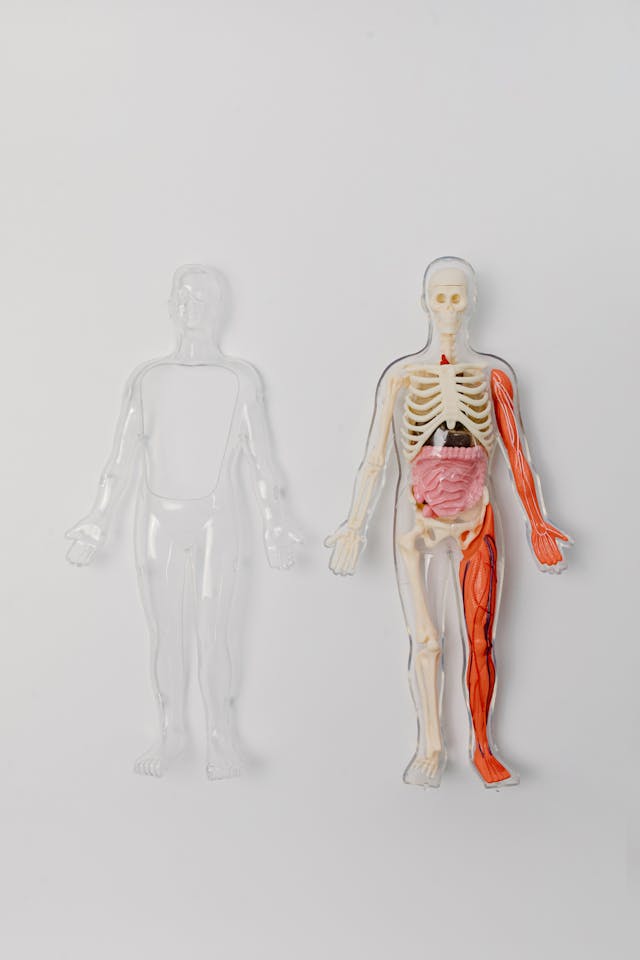 In this guide, we’ll explore what minimally invasive techniques in general surgery involves, the key advantages for patients, and the types of conditions commonly treated using these advanced methods.
In this guide, we’ll explore what minimally invasive techniques in general surgery involves, the key advantages for patients, and the types of conditions commonly treated using these advanced methods.
Minimally invasive surgery has transformed the field of general surgery, offering patients an effective way to address various health conditions with reduced pain, quicker recovery, and minimal scarring. This approach relies on advanced surgical technology, allowing surgeons to perform complex procedures through small incisions rather than the larger cuts used in traditional surgery. Today, minimally invasive techniques are applied in a wide range of procedures, including hernia repair, gallbladder removal, colorectal surgery, and many others.
What is Minimally Invasive Surgery?
Minimally invasive surgery involves performing surgical procedures through small incisions using specialized tools and imaging technology. Instead of making a large incision to access the surgical site, surgeons use instruments such as laparoscopes or robotic systems to view and operate on internal organs. A laparoscope is a thin tube with a camera that allows the surgeon to see inside the body, while robotic systems provide enhanced precision, control, and flexibility.
The two primary types of minimally invasive surgery are:
- Laparoscopic Surgery: This technique uses a laparoscope, which is inserted through small incisions to provide a clear view of the surgical site. The surgeon performs the operation using small, specialized instruments.
- Robotic-Assisted Surgery: Robotic systems, such as the da Vinci Surgical System, allow surgeons to perform procedures with greater precision and control. The surgeon operates the robotic arms from a console, which enhances accuracy, particularly in delicate and complex surgeries.
Advantages of Minimally Invasive Surgery
Minimally invasive surgery offers several benefits over traditional open surgery, making it an attractive option for many patients. Here are some of the primary advantages:
- Smaller Incisions and Minimal Scarring: Minimally invasive techniques require only small incisions, typically around 1-2 centimeters, as opposed to larger incisions in traditional surgery. This results in less visible scarring, which can improve physical and psychological recovery.
- Reduced Pain and Discomfort: Smaller incisions mean less trauma to the body, resulting in reduced pain during and after surgery. Patients typically require fewer pain medications post-operatively, which contributes to a smoother recovery process.
- Faster Recovery Time: Patients undergoing minimally invasive surgery generally experience a quicker recovery than those who have traditional open surgery. This allows them to return to daily activities and work sooner, reducing the overall impact on their lifestyle.
- Shorter Hospital Stays: Minimally invasive surgery often requires a shorter hospital stay, with many patients able to go home the same day or within 1-2 days. This lowers healthcare costs and minimizes the risk of hospital-acquired infections.
- Lower Risk of Complications: Due to the smaller incisions and reduced tissue trauma, minimally invasive surgery is associated with a lower risk of complications such as infections, blood loss, and post-operative complications.
- Improved Precision: Robotic-assisted surgery, in particular, enhances the surgeon’s precision and control. This is especially beneficial for complex procedures, allowing for more accurate results and better outcomes for patients.

Conditions Commonly Treated with Minimally Invasive Surgery
Minimally invasive techniques are used to treat a wide range of conditions across various specialties in general surgery. Some of the most common conditions treated with minimally invasive surgery include:
1. Gallbladder Disease
Minimally invasive surgery, such as laparoscopic cholecystectomy, is the preferred method for removing the gallbladder when treating gallbladder disease, including gallstones and cholecystitis. This procedure involves making small incisions in the abdomen and using a laparoscope to guide the removal of the gallbladder, resulting in less pain and faster recovery compared to open surgery.
2. Hernia Repair
Hernia repair can be effectively performed using minimally invasive techniques, such as laparoscopic hernia repair or robotic-assisted hernia repair. These methods allow surgeons to reinforce the weakened area with mesh through small incisions, reducing the risk of recurrence and promoting quicker healing.
3. Colorectal Surgery
Conditions such as diverticulitis, colorectal cancer, and inflammatory bowel disease (IBD) may require colorectal surgery. Minimally invasive approaches, including laparoscopic and robotic-assisted colorectal surgery, allow for precise removal of diseased sections of the colon or rectum with minimal impact on surrounding tissue.
4. Appendectomy
For cases of appendicitis, a laparoscopic appendectomy is often used to remove the inflamed appendix. This minimally invasive technique provides faster recovery and reduced pain, enabling patients to return to their daily routines quickly.
5. Bariatric (Weight Loss) Surgery
Bariatric surgery, such as laparoscopic gastric bypass or sleeve gastrectomy, is commonly performed to treat obesity and related health conditions. Minimally invasive bariatric surgery allows for effective weight loss with smaller incisions, less post-operative pain, and a shorter recovery period.
6. Anti-Reflux Surgery (GERD)
For severe gastroesophageal reflux disease (GERD), a minimally invasive procedure called laparoscopic fundoplication can be used to prevent acid reflux. This involves wrapping the top of the stomach around the lower esophagus to strengthen the valve and reduce acid reflux symptoms.
Robotic-Assisted Surgery: Enhancing Precision and Control
Robotic-assisted surgery is a form of minimally invasive surgery that offers even greater precision, control, and flexibility. During robotic-assisted procedures, the surgeon operates robotic arms that can mimic the movements of the human wrist, allowing for complex maneuvers that are difficult to achieve with traditional laparoscopy. The benefits of robotic-assisted surgery include:
- Increased Dexterity: Robotic systems provide enhanced control and flexibility, allowing surgeons to perform intricate movements and access hard-to-reach areas.
- Enhanced Visualization: Robotic systems provide high-definition, 3D visualization, allowing surgeons to view the surgical site in great detail, improving accuracy and safety.
- Reduced Tremor: Robotic systems minimize natural hand tremors, providing smooth and precise movements during surgery.
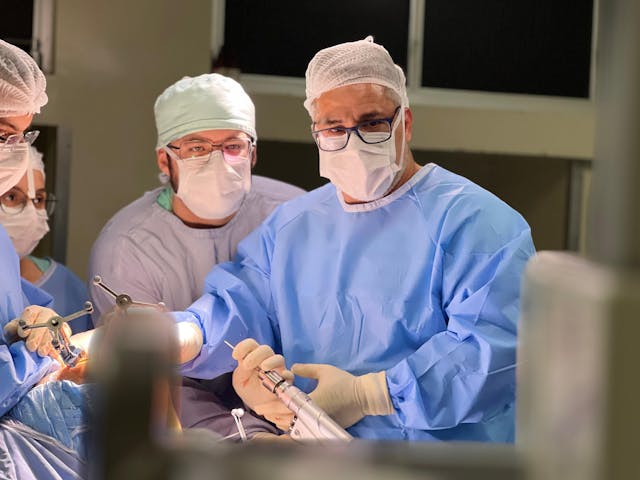
Recovery and Post-Operative Care After Minimally Invasive Surgery
Recovery after minimally invasive surgery is generally faster and less painful than recovery from traditional open surgery. Here’s what most patients can expect:
- Shorter Hospital Stay: Many minimally invasive surgeries are outpatient procedures or require only a short hospital stay, allowing patients to return home sooner.
- Less Post-Operative Pain: Patients typically experience less pain, reducing the need for pain medications and contributing to a more comfortable recovery.
- Quick Return to Activities: Patients can usually resume light activities within a few days and gradually return to their regular routines, including work, within a few weeks.
- Reduced Scarring: Small incisions result in minimal scarring, which can be beneficial for both physical recovery and self-esteem.
Minimally Invasive Techniques in General Surgery: Conclusion
Minimally invasive surgery has revolutionized general surgery, providing patients with safer, more comfortable, and quicker treatment options. If you have been diagnosed with a condition that may require surgery, consult with a general surgeon to discuss whether a minimally invasive approach is suitable for your case. With the latest advancements in surgical technology, many procedures that once required open surgery can now be performed with minimally invasive techniques, offering better outcomes and faster recovery.
For those in Manhattan seeking expert general surgical care, the team at Lenox Hill Minimally Invasive Surgery specializes in minimally invasive techniques, providing patients with compassionate, high-quality care. Contact us today to schedule a consultation and learn more about how minimally invasive surgery can benefit you.
Contact Information
LENOX HILL MINIMALLY INVASIVE SURGERY
117 E 77th Street
New York, NY 10075
646-846-1136
admin@lenoxmis.com
Visit our website for more information: https://lenoxhillminimallyinvasivesurgery.com/
Minimally Invasive Surgery: Benefits and Procedures
Minimally invasive surgery (MIS) has revolutionized the field of surgery, offering numerous benefits over traditional open surgery. This guide explores the advantages and common procedures associated with minimally invasive techniques.

Benefits of Minimally Invasive Surgery
Minimally invasive surgery involves smaller incisions compared to traditional surgery, which leads to several key benefits:
- Reduced Pain: Smaller incisions result in less tissue damage, leading to decreased postoperative pain and discomfort.
- Shorter Recovery Time: Patients typically experience faster recovery times, allowing them to return to normal activities sooner.
- Lower Risk of Infection: The smaller incisions used in MIS reduce the risk of infection and other complications.
- Minimal Scarring: With less tissue disruption, patients benefit from minimal scarring and improved cosmetic outcomes.
- Reduced Blood Loss: MIS techniques often involve less blood loss during surgery, reducing the need for blood transfusions.
Common Minimally Invasive Procedures
Several surgical procedures can be performed using minimally invasive techniques. Here are some of the most common ones:
Laparoscopic Surgery
Laparoscopic surgery uses a thin, flexible tube with a camera and light at the end (a laparoscope) to view the inside of the abdomen. Surgeons make small incisions to insert surgical instruments and perform procedures such as gallbladder removal, hernia repair, and appendectomy.
Arthroscopic Surgery
Arthroscopic surgery is used to diagnose and treat joint problems. A small camera, called an arthroscope, is inserted into the joint through a tiny incision. This technique is commonly used for procedures on the knee, shoulder, elbow, and wrist.
Robotic-Assisted Surgery
Robotic-assisted surgery involves the use of robotic systems to enhance the precision and control of the surgeon. The surgeon operates the robot from a console, allowing for highly accurate movements. This technique is often used for complex procedures such as prostate surgery, hysterectomy, and cardiac surgery.
Endoscopic Surgery
Endoscopic surgery involves using an endoscope, a flexible tube with a camera, to access internal organs and tissues. This technique is commonly used for gastrointestinal procedures, such as removing polyps from the colon or treating conditions like gastroesophageal reflux disease (GERD).
Patient Eligibility for Minimally Invasive Surgery
Not all patients are candidates for minimally invasive surgery. Factors such as the type and severity of the condition, patient health, and previous surgical history play a role in determining eligibility. A thorough evaluation by a qualified surgeon is essential to decide the best surgical approach.
Preparing for Minimally Invasive Surgery
Preparation for MIS involves several steps, including preoperative evaluations, discussing medication adjustments, and understanding the procedure and recovery expectations. Patients should follow all preoperative instructions provided by their surgeon to ensure the best possible outcomes.
Postoperative Care and Recovery
Postoperative care following MIS is typically less intensive than traditional surgery. Patients can expect shorter hospital stays, quicker return to normal activities, and less postoperative pain. However, it is crucial to follow the surgeon’s postoperative instructions to promote optimal healing and prevent complications.
Minimally Invasive Surgery: Conclusion
Minimally invasive surgery offers numerous benefits, including reduced pain, shorter recovery times, lower risk of infection, minimal scarring, and reduced blood loss. Understanding the procedures and preparing adequately can help ensure a successful outcome.
For expert guidance on minimally invasive surgery and to determine if you are a candidate, contact Lenox Hill Minimally Invasive Surgery.
LENOX HILL MINIMALLY INVASIVE SURGERY
117 E 77th Street
Suite 1A
New York, NY 10075
Phone: 646-846-1136
Email: admin@lenoxmis.com
What Are The Benefits Of Minimally Invasive Surgery?
There was a time when the word “surgery” used to scare people, and they would try their best to evade a surgical procedure. The hesitance is understandable as the idea of a large cut on your body is discomforting in many ways. However, thanks to the evolution in medical science, surgical techniques have improved tremendously.
Now, surgical procedures, either big or small, are done within a few minutes to a few hours. The best part about the minimally invasive surgeries is the painless procedure with fast recovery. The advanced techniques are helping with quality treatments to patients who have to undergo surgical procedures.
What Is Minimally Invasive Surgery?
Unlike the traditional open surgeries that would require a large incision, a surgeon makes multiple tiny incisions of less than an inch. For the process, the surgeon uses
- Small surgical instruments, such as a clamp or knife, for incisions
- A laparoscope, i.e., a tiny tube with a miniature camera at one end.
Once the surgeon marks the incisions, he/she then passes the mini camera through one of the cuts. The doctor monitors the images captured by the camera on the screen and uses them as a reference. These images give the surgeon a clear picture of the area undergoing surgery.
The doctor may also insert specialized surgical instruments, such as a balloon or flexible stent, through the incisions if required. After the surgery, the surgeon stitches the incisions and sometimes places a mesh for additional support.
Common Minimally Invasive Procedures
Minimally invasive surgeries have become the first choice of patients for multiple medical conditions. In fact, it would not be wrong to say that these surgeries are now the standard surgical procedures for many routine operations.
Your doctor may recommend a minimally invasive surgery for:
- Appendectomy –the removal of the appendix
- Hernia repair
- Cholecystectomy –the removal of the gallbladder
- Abdominal examination
- Colon resection
- Gynecological surgeries
Depending upon the location of the surgery, you may call a minimally invasive technique an endoscopic surgery, a keyhole surgery, thoracoscopic surgery, or laparoscopy.
Benefits of the Minimally Invasive Surgery
Compared to the traditional open surgery, minimally invasive surgery has several benefits to offer. Not only is the procedure quick and less painful, but also ensures rapid recovery. Let’s have a look at some of the advantages.
Small Incisions/Cuts
One of the biggest advantages of the minimally invasive surgeries is the smaller incisions. The surgeon marks a few tiny incisions, big enough to insert a tube, laparoscope, or other small surgical instruments.
Accurate Procedures
The minimally invasive surgeries are more accurate than the open surgeries because of the laparoscope that gives a clear picture of the internal structures.
Less Painful Procedure
It is proven that minimally invasive surgeries are less painful in comparison to open surgeries. The advanced technique does not cause discomfort or any damage to the healthy tissues. Also, there is reduced blood loss in invasive surgeries.
Minimal Scars
Since the size of the incisions is smaller in the minimally invasive techniques, you may have very small or unnoticeable scar with a few stitches only.
Rapid Recovery
The minimal procedures allow the patient to heal sooner and resume the normal routine. Since the surgeries take a few hours to complete, the patient may leave for home the same day or the next day. A short hospital stay means reduced medical bill.
Final Thoughts
Minimally Invasive surgeries are the standard surgical techniques widely in practice today. Whether you have a minor issue or want a surgical intervention for a major health condition, it is the best option. At Lenox Hill Minimally Invasive Surgery, we have compassionate, dedicated, and highly professional surgeons who are expert in minimally invasive surgeries. Contact us today and book an appointment with the most skilled surgeons in NYC.
Common Types of Laparoscopic Surgery
 Laparoscopic surgery is a type of minimally invasive surgery in which a number of small incisions are made, around a quarter inch in length each. Using smaller incisions means that patients experience less pain and a shorter recuperation period. Below is a guide to some of the most common types of laparoscopic surgery.
Laparoscopic surgery is a type of minimally invasive surgery in which a number of small incisions are made, around a quarter inch in length each. Using smaller incisions means that patients experience less pain and a shorter recuperation period. Below is a guide to some of the most common types of laparoscopic surgery.
Colon
 Laparoscopic surgery of the colon requires four or five small incisions of around a quarter inch in size. Through these incisions, the surgeon uses a fiber optic camera connected to a monitor to see inside the patient and guide the other instruments.
Laparoscopic surgery of the colon requires four or five small incisions of around a quarter inch in size. Through these incisions, the surgeon uses a fiber optic camera connected to a monitor to see inside the patient and guide the other instruments.
Inguinal Hernia Repair
Laparoscopic inguinal hernia repairs are done via a laparoscope, which is fed into small incisions in the abdominal wall. A camera is fed through, as is a tube which allows for the abdominal cavity to be inflated with carbon dioxide. This allows more room for the surgeon to perform the procedure. The hole through which the muscle is protruding is covered with a surgical mesh from within and surgical staples are used to patch it.
Gallbladder Removal
The gallbladder is an organ located on the right-hand-side of the body, just under the rib cage and near the liver. Removal of the gall bladder is one of the most common targets for laparoscopic surgery. The gall bladder stores bile, which is used to assist in the breakdown of fatty foods. When we don’t eat for extended periods, such as during sleep, the gallbladder stores the bile ready to release it when it’s needed.
Laparoscopic gallbladder removal involves four small incisions in the abdomen, whereas in open surgery a five- to seven-inch incision is required. With laparoscopic surgery, surgical instruments and a camera are fed into the incisions in order to make the necessary cuts at various points around the organ.
Advantages of Laparoscopic Surgery
 Laparoscopic surgery is much less painful for patients in the immediate aftermath of their surgery and in some cases, they are even able to go home on the same day. The overall recuperation period is much shorter than it is for open surgery and the incidence of complications is lower. Laparoscopic surgery also causes very little cosmetic damage when compared with open surgery and for some patients, this is very important.
Laparoscopic surgery is much less painful for patients in the immediate aftermath of their surgery and in some cases, they are even able to go home on the same day. The overall recuperation period is much shorter than it is for open surgery and the incidence of complications is lower. Laparoscopic surgery also causes very little cosmetic damage when compared with open surgery and for some patients, this is very important.
Laparoscopic surgery of the colon, hernia repair, gallbladder removal, and many other forms of minimally invasive surgery are available at our clinic. Drop by for a consultation.














